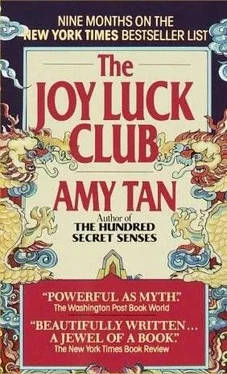She was crying now, rambling like a crazy woman: "You can see now, a fourth wife is less than a fifth wife. An-mei, you must not forget. I was a first wife, yi tai , the wife of a scholar. Your mother was not always Fourth Wife, Sz Tai! "
She said this word, sz , so hatefully I shuddered. It sounded like the sz that means "die." And I remembered Popo once telling me four is a very unlucky number because if you say it in an angry way, it always comes out wrong.
The Cold Dew came. It became chilly, and Second Wife and Third Wife, their children and servants returned home to Tientsin. There was a big commotion when they arrived. Wu Tsing had allowed the new motorcar to be sent to the railway station, but of course that was not enough to carry them all back. So behind the motorcar came a dozen or so rickshaws, bouncing up and down like crickets following a large shiny beetle. Women began to pour out of the motorcar.
My mother was standing behind me, ready to greet everybody. A woman wearing a plain foreign dress and large, ugly shoes walked toward us. Three girls, one of whom was my age, followed behind.
"This is Third Wife and her three daughters," said my mother.
Those three girls were even more shy than I. They crowded around their mother with bowed heads and did not speak. But I continued to stare. They were as plain as their mother, with big teeth, thick lips, and eyebrows as bushy as a caterpillar. Third Wife welcomed me warmly and allowed me to carry one of her packages.
I felt my mother's hand stiffen on my shoulder. "And there is Second Wife. She will want you to call her Big Mother," she whispered.
I saw a woman wearing a long black fur coat and dark Western clothes, very fancy. And in her arms she held a little boy with fat rosy cheeks who looked to be two years old.
"He is Syaudi, your littlest brother," my mother whispered. He wore a cap made out of the same dark fur and was winding his little finger around Second Wife's long pearl necklace. I wondered how she could have a baby this young. Second Wife was handsome enough and seemed healthy, but she was quite old, perhaps forty-five. She handed the baby to a servant and then began to give instructions to the many people who still crowded around her.
And then Second Wife walked toward me, smiling, her fur coat gleaming with every step. She stared, as if she were examining me, as if she recognized me. Finally she smiled and patted my head. And then with a swift, graceful movement of her small hands, she removed her long pearly strand and put it around my neck.
This was the most beautiful piece of jewelry I had ever touched. It was designed in the Western style, a long strand, each bead the same size and of an identical pinkish tone, with a heavy brooch of ornate silver to clasp the ends together.
My mother immediately protested: "This is too much for a small child. She will break it. She will lose it."
But Second Wife simply said to me: "Such a pretty girl needs something to put the light on her face."
I could see by the way my mother shrank back and became quiet that she was angry. She did not like Second Wife. I had to be careful how I showed my feelings: not to let my mother think Second Wife had won me over. Yet I had this reckless feeling. I was overjoyed that Second Wife had shown me this special favor.
"Thank you, Big Mother," I said to Second Wife. And I was looking down to avoid showing her my face, but still I could not help smiling.
When my mother and I had tea in her room later that afternoon, I knew she was angry.
"Be careful, An-mei," she said. "What you hear is not genuine. She makes clouds with one hand, rain with the other. She is trying to trick you, so you will do anything for her."
I sat quietly, trying not to listen to my mother. I was thinking how much my mother complained, that perhaps all of her unhappiness sprang from her complaints. I was thinking how I should not listen to her.
"Give the necklace to me," she said suddenly.
I looked at her without moving.
"You do not believe me, so you must give me the necklace. I will not let her buy you for such a cheap price."
And when I still did not move, she stood up and walked over, and lifted that necklace off. And before I could cry to stop her, she put the necklace under her shoe and stepped on it. When she put it on the table, I saw what she had done. This necklace that had almost bought my heart and mind now had one bead of crushed glass.
Later she removed that broken bead and knotted the space together so the necklace looked whole again. She told me to wear the necklace every day for one week so I would remember how easy it is to lose myself to something false. And after I wore those fake pearls long enough to learn this lesson, she let me take them off. Then she opened a box, and turned to me: "Now can you recognize what is true?" And I nodded.
She put something in my hand. It was a heavy ring of watery blue sapphire, with a star in its center so pure that I never ceased to look at that ring with wonder.
Before the second cold month began, First Wife returned from Peking, where she kept a house and lived with her two unmarried daughters. I remember thinking that First Wife would make Second Wife bow to her ways. First Wife was the head wife, by law and by custom.
But First Wife turned out to be a living ghost, no threat to Second Wife, who had her strong spirit intact. First Wife looked quite ancient and frail with her rounded body, bound feet, her old-style padded jacket and pants, and plain, lined face. But now that I remember her, she must not have been too old, maybe Wu Tsing's age, so she was perhaps fifty.
When I met First Wife, I thought she was blind. She acted as if she did not see me. She did not see Wu Tsing. She did not see my mother. And yet she could see her two daughters, two spinsters beyond the marriageable age; they were at least twenty-five. And she always regained her sight in time to scold the two dogs for sniffing in her room, digging in the garden outside her window, or wetting on a table leg.
"Why does First Wife sometimes see and sometimes not see?" I asked Yan Chang one night as she helped me bathe.
"First Wife says she sees only what is Buddha perfection," said Yan Chang. "She says she is blind to most faults."
Yan Chang said that First Wife chose to be blind to the unhappiness of her marriage. She and Wu Tsing had been joined in tyandi , heaven and earth, so theirs was a spiritual marriage arranged by a matchmaker, ordered by his parents, and protected by the spirits of their ancestors. But after the first year of marriage, First Wife had given birth to a girl with one leg too short. And this misfortune led First Wife to begin a trek to Buddhist temples, to offer alms and tailored silk gowns in honor of Buddha's image, to burn incense and pray to Buddha to lengthen her daughter's leg. As it happened, Buddha chose instead to bless First Wife with another daughter, this one with two perfect legs, but-alas!-with a brown tea stain splashed over half her face. With this second misfortune, First Wife began to go on so many pilgrimages to Tsinan, just a half-day's train ride to the south, that Wu Tsing bought her a house near the Thousand Buddha Cliff and Bubbling Springs Bamboo Grove. And every year he increased the allowance she needed to manage her own household there. So twice a year, during the coldest and hottest months of the year, she returned to Tientsin to pay her respects and suffer sight unseen in her husband's household. And each time she returned, she remained in her bedroom, sitting all day like a Buddha, smoking her opium, talking softly to herself. She did not come downstairs for meals. Instead she fasted or ate vegetarian meals in her room. And Wu Tsing would make a mid-morning visit in her bedroom once a week, drinking tea for half an hour, inquiring about her health. He did not bother her at night.
Читать дальше












